Search Results for Tag: Renewables
Climate-friendly clean energy from Abu Dhabi?
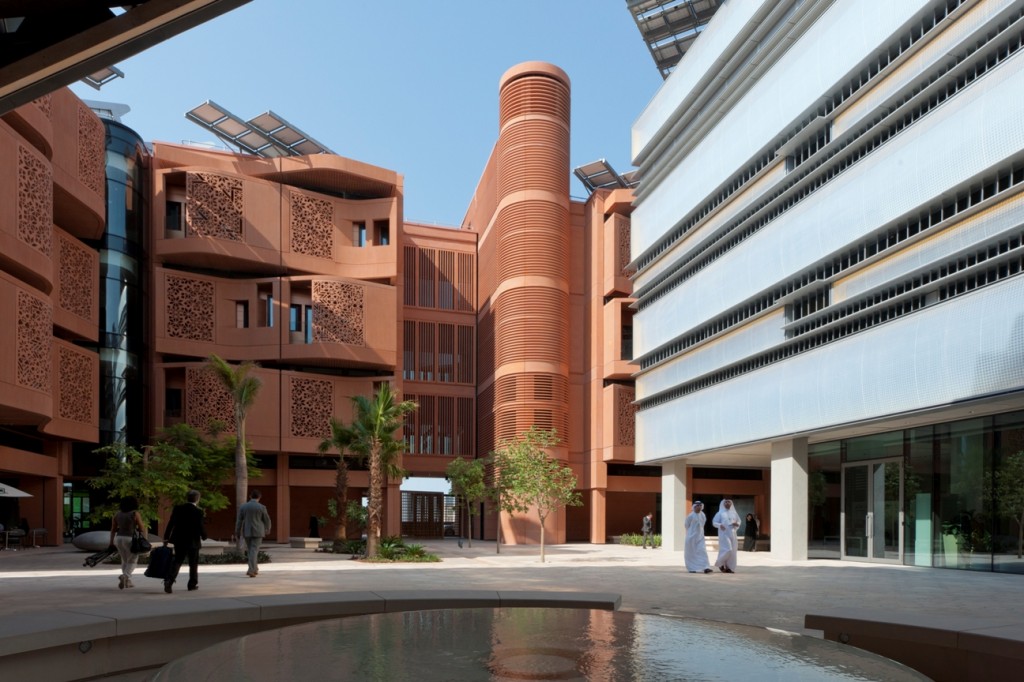
Masdar City, designed as a CO2-neutral sustainable model city for the future. It has its fans and its critics – I will have a look for myself this week.
Ever since it was decided to hold the 2012 UN climate conference in Qatar, I’ve been interested in the position of renewable energies in the oil- and gas-rich Gulf region. These countries would have the wealth to invest in innovative technologies and plenty of sun to harvest – but is there the motivation, given that their prosperity is based on the fossil fuels business? Recently, things seem to be moving with regard to solar energy in the area.Tonight I arrived in Abu Dhabi, the home of Masdar city. The World Future Energy Summit will be held here this coming week, as part of Abu Dhabi Sustainability Week. Given the huge ecological footprint and per-capita emissions record of the region, thinking about sustainability can only be a good idea. I’ll be visiting Masdar in the course of the week and attending some of the events – including an international water summit, as well as the energy meetings. It will be good to get an impression first-hand of what is happening in this key region with regard to halting climate change – and what would still need to be done.
Spring sun triggers Antarctic smart grid
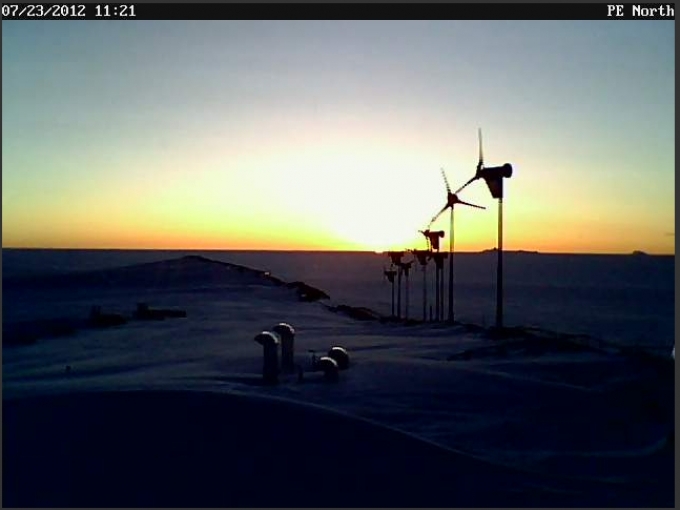
Spring sun getting ready to take over from winter wind at Belgium's Antarctic station. Picture from the webcam, taken in July, copyright of International Polar Foundation
As the webcam shows, the sun has returned to Antarctica after the long dark winter. This is at Belgium’s station, Princess Elisabeth Antarctica, the “Zero Emissions Station”, as you may have read before on the Ice Blog. The station is uninhabited in winter, and controlled remotely via satellite. In winter, with no sun aboutj, power comes from wind turbines. Over the last few days, enough sunlight has touched the solar panels to wake up the team of “Sunny Boys” – inverters that convert power coming from the solar panels so that it’s compatible with the station’s electric installation. The first of these awoke on July 15th, along with four others. Now up to ten are running, around half of the station’s total capacity.
With such a small quantity of sunlight, the solar panels aren’t producing much energy yet, but the station’s smart grid is reacting to the end of the long polar night: Princess Elisabeth Antarctica is waking up. “It is all going much faster than expected” says station engineer Erik Verhagen. The humans only return to Princess Elisabeth Antarctica in November, but preparations are already under way for another summer research season.
The only thing that bothers me about this sunny story is that when the sun comes back to Antarctica – we must be heading for autumn here in the north already. The temperature felt like it here in Bonn this morning – but the sun is still providing a fair bit of energy from the solar collectors on the rooftops here.
Scotland’s waves surge ahead with climate-friendly energy
The waters between the north of Scotland and the Orkney islands have just been declared a Marine Energy Park. What does that mean? Well, I’m just back from a visit to the mainland coast in the Caithness region, Orkney and Edinburgh, headquarters of the Scottish government and the leading marine energy companies, where I was able to see for myself. The steady waves and strong currents of these waters make it an ideal location for devices to turn the power of the sea into electricity. I can quite understand why the Scottish and the UK governments want to heighten the international reputation of the region as a potential provider of clean, climate-friendly energy and speed up the development. Orkney is home to EMEC, the world-leading European marine Energy Centre, where developers from all over the world are testing a wide range of wave and tidal energy devices. The centre even has a grid connection, so that energy produced in the water can be fed in.
I will be writing more about this on DW’s Environment site in the weeks to come. I’ll also be reporting for our radio programe Living Planet. I certainly got the feeling that some of the marine energy devices are ready to move on from the test stage to commercial application and viability in the next couple of years.
Energy from waves or tides has the potential to generate 27GW of power in the UK alone by 2050, equivalent to the power generated from eight coal fired power stations, according to the UK government. Minister of State for Energy and Climate Change Greg Barker says the industry could sustain thousands of jobs in a sector worth a possible £15bn to the economy by 2050.
The Scottish Energy, Enterprise and Tourism Minister Fergus Ewing was equally upbeat when I interviewed him last week. More from the Minister and those directly involved in marine energy in the not-too-distant future. Meanwhile, well done Scotland for pushing ahead with renewable energy and “surfing the waves” towards the ambitious – but not unrealistic- target of 100% renewable electricity by 2020.
Fresh wind for the climate?
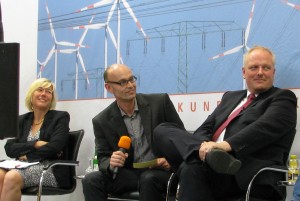
My colleague Gero Rueter chairing the panel, here with Syliva Pilarsky-Grosch, vice-president of the German Bundesverband WindEnergie and Ulrich Kelber, member of the Bundestag and SPD expert on environment and energy issues.
The World Wind Energy Conference started in Bonn today, focusing attention on the role of decentralized wind power. It’s an interesting topic at this particular time with a big debate going on here in Germany over the role large offshore wind parks should play in securing a renewable energy supply. At a kick-off panel discussion organised last night by the Friedrich Ebert Foundation and the World Wind Energy Association, one of the main conference organisers, the speakers provided plenty of arguments in favour of smaller, decentralized systems with different ownership models, from citizens’ groups to local authorities, rather than large offshore parks run by big industry. At today’s official opening ceremony in the Bonn Conference Centre, a federal government representative, Secretary of State in the Environment Ministry Jürgen Becker, made the case for having both. The main problem with the big offshore parks at the moment is how to successfully connect them to the grid and get the power from Germany’s North Sea coast to where it’s needed farther south. Interesting discussions ahead. There are large delegations from China and Canada attending the conference, countries with a key interest in wind power. I bumped into a colleague from Japan this morning, who said he was covering the conference because of the urgent need to develop renewables in Japan after Fukushima.
Renewables Grid: Protect the climate at the cost of the environment?
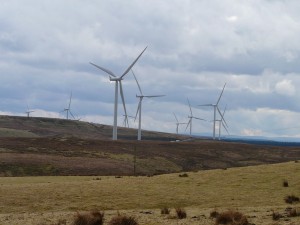
Renewables and countryside - conflict unavoidable? (I took this pic at Whitelee windfarm in Scotland)
The transition to renewable energy here in Germany has sparked off a discussion about the electricity grid. A similar discussion has been going on in the UK. One of the challenges is to get power from areas where it is produced – wind or marine energy from the coast, for instance – to the industrial and population centres, where it’s needed most. When this means new power-lines in areas enjoying nature protection, for instance habitats for particular plants and animals, or even just areas of great natural beauty, there is bound to be conflict. Germany’s federal economics minister and leader of the German Liberal Party the FDP Philip Rösler made the headlines this morning calling for environmental protection legislation to be temporarily shelved in some cases to make way for a quicker extension of the grid. I think this is a conflict we are going to face more and more often as the effects of climate change become more evident and the need to switch to renewables ever more urgent. Would it be too cynical to suggest some industries might want to put off the transition and benefit from a relaxation of environmental standards as the politicians become more desperate to meet emissions requirements? Perhaps. The Economics Minister is certainly laying himself open to criticism by conservationists who accuse him of taking advantage of the climate problem to help industry get round environment legislation. The German ngo NABU says Minister Rösler risks losing public support for the energy transition by suggesting this sort of course. They also stress that there is a “European Grid Declaration on Electricity Network Development and Nature Conservation in Europe“, signed by grid operators and ngos from across the continent.
Interesting times ahead.




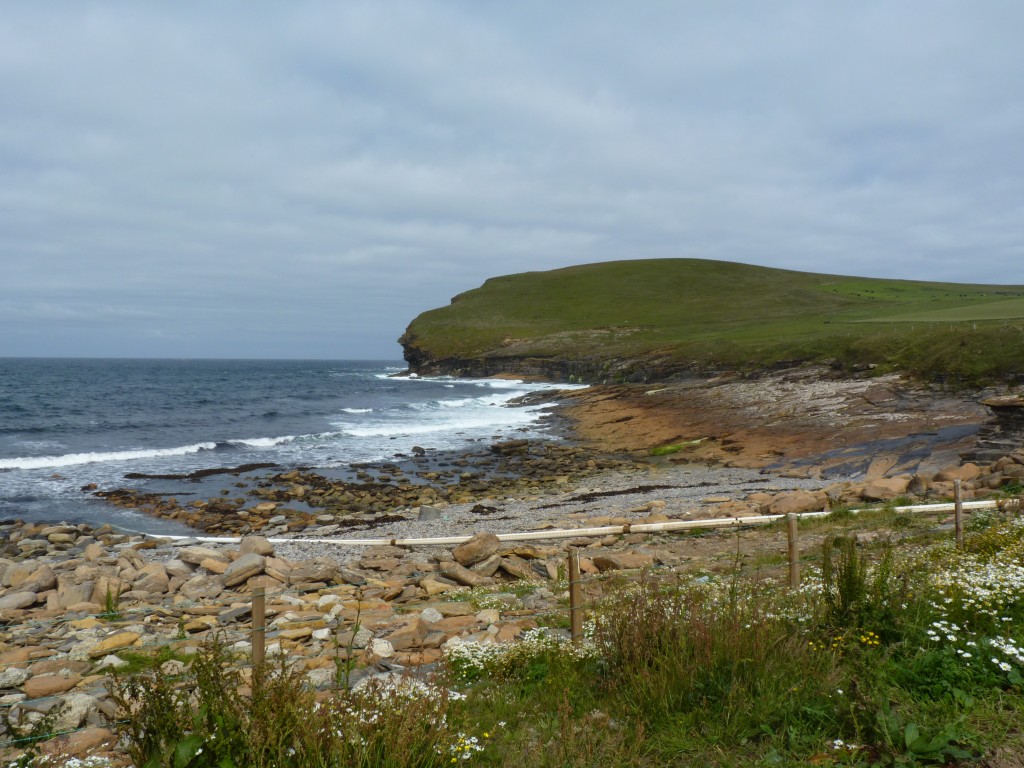
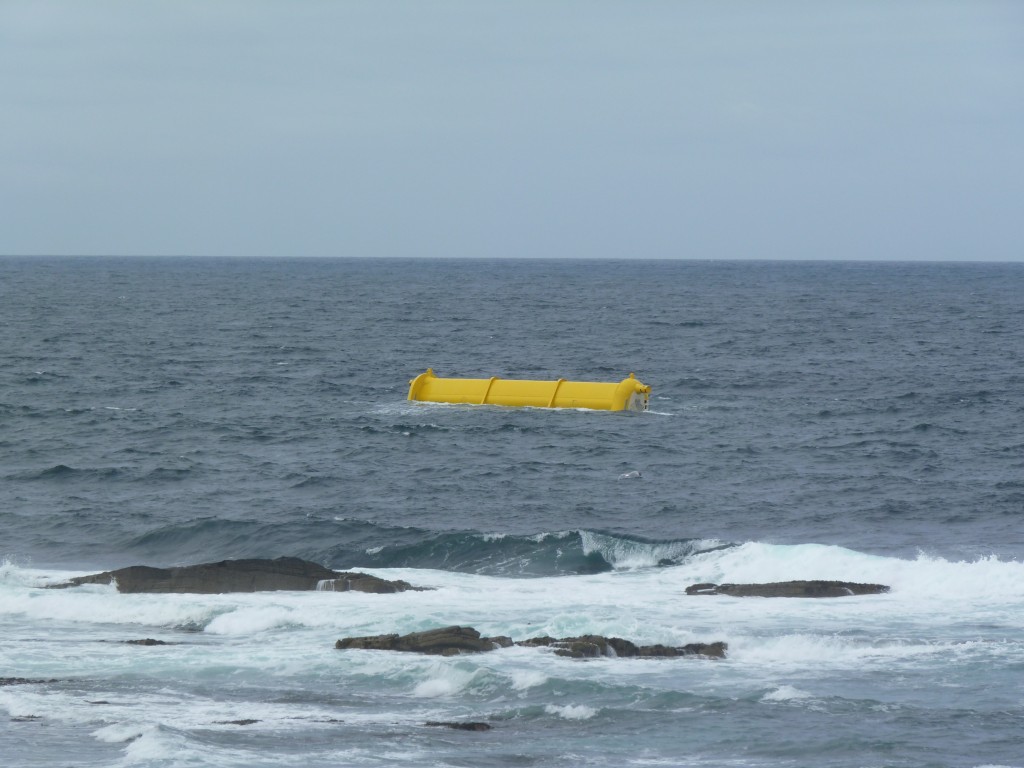
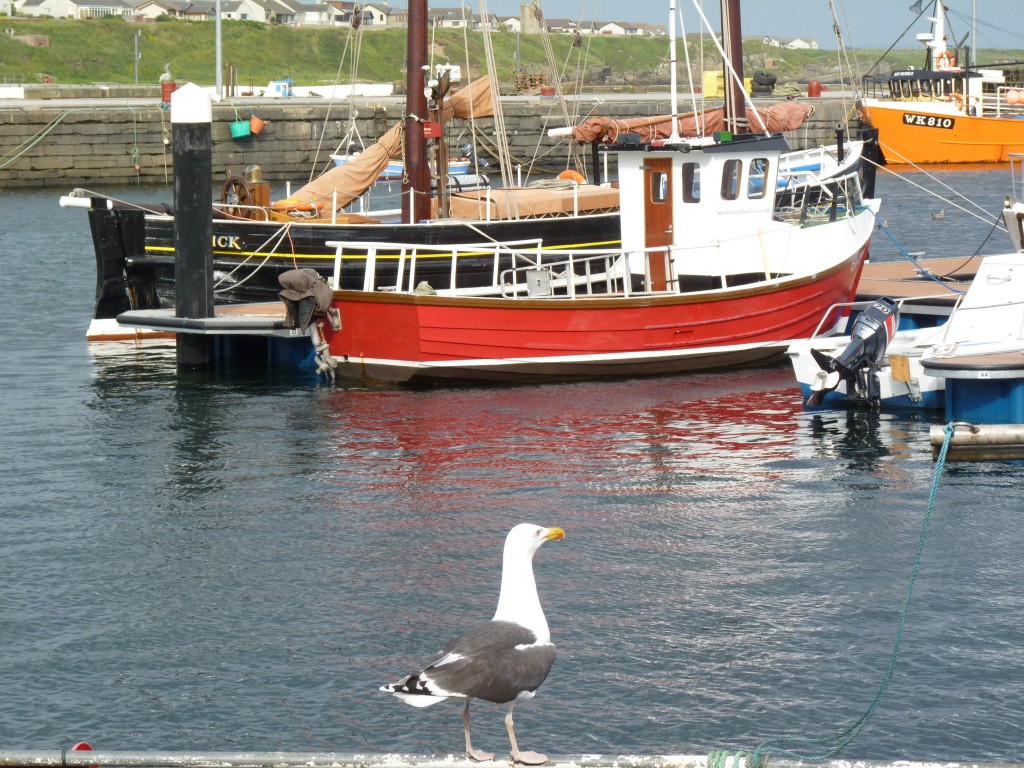
















Feedback